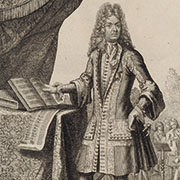Lully’s Alceste represents a milestone in French Baroque opera. With the publication of a critical edition as part of the Complete Edition, the work is now available in an authoritative form for scholars and practical performing use.
Alceste ou le triomphe d’Alcide occupies a key position in the history of the tragédie en musique. This is shown by its exceptional linguistic and musical qualities, as well as by the literary-theoretical disputes between the representatives of classical French tragédie and Charles Perrault who, commissioned by the King, published the essay La critique d’Alceste in defence of the work, as a result of which the new genre of “tragédie en musique” finally prevailed in France in the face of considerable resistance. With this, although for other reasons too, Alceste occupies a comparable position in history to Monteverdi’s Orfeo. Louis XIV, who is present in two characters in the opera, Apollon and Alcide, recognized the significance the genre held for his position in France and his international prestige. As well as this, he was full of enthusiasm for the music and the production of the opera.
The general human patterns of behaviour which form the basis of the plot include the moral greatness of Alceste and Alcide, the comically-depicted liberality in the love of lower-class characters, the egoism of an aged ruler, and the undisguised demand for payments to Charon on behlf of the dead who he is to transport over the Styx into the underworld.
Henry Prunières published an edition in 1932 as part of his Œuvres complètes, based on a very inadequate knowledge of the sources, and which barely met the requirements of a critical edition then.
For the new critical edition, 27 Partitions générales, the printed Partition réduite by Henri de Baussen, and ten reduced manuscript scores were consulted. The recent lucky discovery of the Alceste copy from Lully’s private library, which corresponds with another manuscript dated 1682, enabled an edition to be created reflecting the final version authorised by the composer. This is a copy almost free of mistakes, including a previously unknown version of the funeral ceremony in Act III with the systematic figuring of all the vocal pieces, the ornamentation of the vocal and instrumental parts, and the baying of Cerberus in a scene provided with onomatopoeic sylllables. This was parodied after the first performances in a chanson which became famous and led to Lully’s initial cutting of the baying of Cerberus, ultimately retained in his final score.
One example (see right hand column) demonstrates which new insights the critical edition enables into the score of Alceste.
The exceptional qualities of Alceste are shown in the dramaturgy of the prologue and the four acts, in the classical language of Quinault, and in the musical form of the scenes and the five divertissements which are compellingly integrated into the plot with a great variety of dances (gavottes, menuets, loures, entrées, marches, rondeaux, airs and gigue). It was almost completely impossible to reproduce the complex score on the usual ruled paper in folio format. Only an evaluation of all the sources made it possible to reconstruct the rich instrumentation (flutes, oboes, trumpets and timpani alternately or colla parte with the strings, musette) and the variously-scored choruses and ensembles (echo chorus, single and double chorus scoring, also with soloists and ensembles) and thus to reveal a previously-unknown richness in the musical form of the score. With the battle music from the second act, the highly expressive funeral ceremony of the third (with funeral march and ceremonial as at a courtly funeral and with an atavistic ritual), the Alecton scene with the baying of the hound of hell, the divertissement from the world of Pluto and Prosperine (dance and gigue of the demons, as well as the ensuing dance choruses in each case) and the celebration in honour of Alcides in the fifth act (including with an “Air dansant” of great dignity), Lully created high points which he never surpassed even in subsequent operas. In the incomparable richness of the songs (also including several “timbres” which have entered the repertoire) and instrumental movements in a diversified drama, Lully shows himself to be at the height of his creative powers.
Herbert Schneider
(Translation: Elizabeth Robinson)
(from [t]akte 2/2017)



